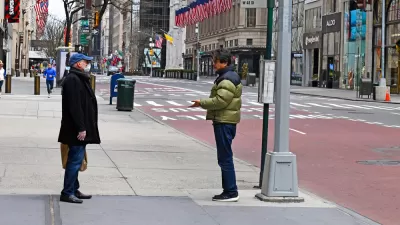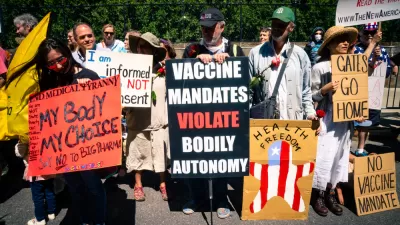Most utilities in the United States have committed to protecting the supply of water for people struggling to pay the bills during the coronavirus.

"Millions of Americans risk losing running water if they fall behind with bill payments in coming months, as mass layoffs triggered by the coronavirus pandemic force families to make impossible tradeoffs on paying household expenses," writes Nina Lakhani.
Data analyzed by Food and Water Watch (FWW) and the Guardian estimates that two-fifths of the country relies on water from utilities that haven't suspended water shut-offs as the country reels from the effects of the coronavirus pandemic—also despite the hygienic necessity of water to combat the spread.
"Yet despite the evolving economic and health crises, less than 60% of the population have so far been protected from water shutoffs," writes Lakhani. "And just 11% of these utilities have explicitly pledged to reconnect households currently without running water due to unpaid bills."
According to the data, the parts of the country most vulnerable to the effects of the public health crisis are more likely to lack protections from utilities—states like Louisiana, Arkansas, Florida, and Oklahoma. By comparison, 12 states—California, Indiana, Kentucky, Maine, Maryland, Michigan, Montana, New Hampshire, New Jersey, North Carolina, Ohio, and Wisconsin—have issued moratoriums on water shut offs.
FULL STORY: Millions in US at risk of 'water shutoffs' amid layoffs triggered by pandemic

Maui's Vacation Rental Debate Turns Ugly
Verbal attacks, misinformation campaigns and fistfights plague a high-stakes debate to convert thousands of vacation rentals into long-term housing.

Planetizen Federal Action Tracker
A weekly monitor of how Trump’s orders and actions are impacting planners and planning in America.

In Urban Planning, AI Prompting Could be the New Design Thinking
Creativity has long been key to great urban design. What if we see AI as our new creative partner?

King County Supportive Housing Program Offers Hope for Unhoused Residents
The county is taking a ‘Housing First’ approach that prioritizes getting people into housing, then offering wraparound supportive services.

Researchers Use AI to Get Clearer Picture of US Housing
Analysts are using artificial intelligence to supercharge their research by allowing them to comb through data faster. Though these AI tools can be error prone, they save time and housing researchers are optimistic about the future.

Making Shared Micromobility More Inclusive
Cities and shared mobility system operators can do more to include people with disabilities in planning and operations, per a new report.
Urban Design for Planners 1: Software Tools
This six-course series explores essential urban design concepts using open source software and equips planners with the tools they need to participate fully in the urban design process.
Planning for Universal Design
Learn the tools for implementing Universal Design in planning regulations.
planning NEXT
Appalachian Highlands Housing Partners
Mpact (founded as Rail~Volution)
City of Camden Redevelopment Agency
City of Astoria
City of Portland
City of Laramie





























